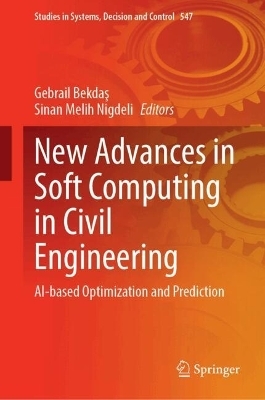
New Advances in Soft Computing in Civil Engineering
Springer International Publishing (Verlag)
978-3-031-65975-1 (ISBN)
Soft computing applications plays a crucial role in civil engineering applications, with engineers striving to create outstanding designs that prioritize safety, aesthetics, cost-efficiency, and environmental considerations. Advanced optimization techniques are especially valuable for complex systems including multi-constraint problems, multi-objective problems and control problems needing iterative processes in solving differential equations.
Throughout history, people have used their creativity to enhance designs in everyday tasks, and this is where metaheuristics come into play, drawing inspiration from nature to develop novel algorithms. These artificial intelligence-based algorithms possess distinctive attributes, and leveraging various features from different algorithms can enhance the effectiveness of optimization, improving precision, computational efficiency, and convergence.
This book serves as a timely resource, summarizing the latest advancements in civil engineering optimization, encompassing both metaheuristic approaches and emerging trends that integrates artificial intelligence and machine learning techniques to predict optimal solutions, streamlining lengthy optimization processes.
The book's chapters cover a wide range of civil engineering applications, with the primary goal being to introduce fundamental concepts and advanced adaptations. This comprehensive resource is designed to provide undergraduates and graduate engineering students with a solid understanding of materials and content, making it a valuable reference for university courses in various civil engineering disciplines.
The book will be edited, and the editors will contribute to most of the chapters. Depending on the availability of high-quality papers, the editors may increase their contributions by sharing recent research projects and postgraduate students' theses.
Introduction to Data Analysis and Machine Learning Applications in Civil Engineering.- Application of Artificial Intelligence (AI) in Civil Engineering.- Machine Learning Applications in Structural Engineering.- A Multi Objective Optimal Design Process for Determination of Link Capacity Expansions.- IoT with Deep Learning in Pipeline Risk Estimation Using Smart Cities Development.- Forecasting of Lake Level by Soft Computing Approaches.- Structural health monitoring using artificial intelligence Challenges, advances and applications.- Optimizing Tuned Mass Damper by Examining Displacement Ratios with and without TMD System.- Evaluation of Predictive Models for Mechanical Properties of Earth Based Composites for Sustainable Building Applications.- Shear Wall Cost Optimization by Employing Harmony Search.- Effect of CatBoost Parameters on Cost Minimiza-tion of Rectangular Section Reinforced Concrete Co lumns Under Uniaxial Bending Effect.- Machine Learning Approaches for Predicting Compressive and Shear Strength of EB FRP Reinforced Concrete Elements: A Comprehensive Review.- A modified Jaya algorithm for optimum design of carbon fiber reinforced polymers.- Prediction of bi-linear strength envelope of unsaturated brazilian soils using machine learning techniques.- Assessment of Unconfined Compressive Strength of Stabilized Soil using Artificial Intelligence Tools A Scientometrics Review.- A Review of Deformations Prediction for Oil and Gas Pipelines using Machine and Deep Learning.- Determination of the Effect of XGBoost's Parameters on a Structural Problem.- Area Optimization of Bending Members with Different Shapes in terms of Pure Bending.- A simplified flower pollination algorithm for structural optimization of trusses.- Investigation of the effect of initial parameters on the performance of metaheuristic algorithms on a structural engineering problem.- Geospatial Multi Criteria Decision Framework for Sanitary Landfill Site Selection in New Delhi, India.- Comparing Classification Algorithms for Predicting Spatial Land Cover via Landscape Indices in Nashik, India.
| Erscheinungsdatum | 08.08.2024 |
|---|---|
| Reihe/Serie | Studies in Systems, Decision and Control |
| Zusatzinfo | IX, 421 p. 158 illus., 122 illus. in color. |
| Verlagsort | Cham |
| Sprache | englisch |
| Maße | 155 x 235 mm |
| Themenwelt | Informatik ► Theorie / Studium ► Künstliche Intelligenz / Robotik |
| Technik ► Bauwesen | |
| Schlagworte | algorithms • Artificial Intelligence • Artificial Neural Networks • bioinspired algorithms • Civil Engineering • Deep learning • evolutionary algorithms • Genetic algorithms • hybrid algorithms • Metaheuristic Algorithms • Nature-Inspired Algorithms • Optimum Design • Swarm intelligence |
| ISBN-10 | 3-031-65975-9 / 3031659759 |
| ISBN-13 | 978-3-031-65975-1 / 9783031659751 |
| Zustand | Neuware |
| Haben Sie eine Frage zum Produkt? |
aus dem Bereich


